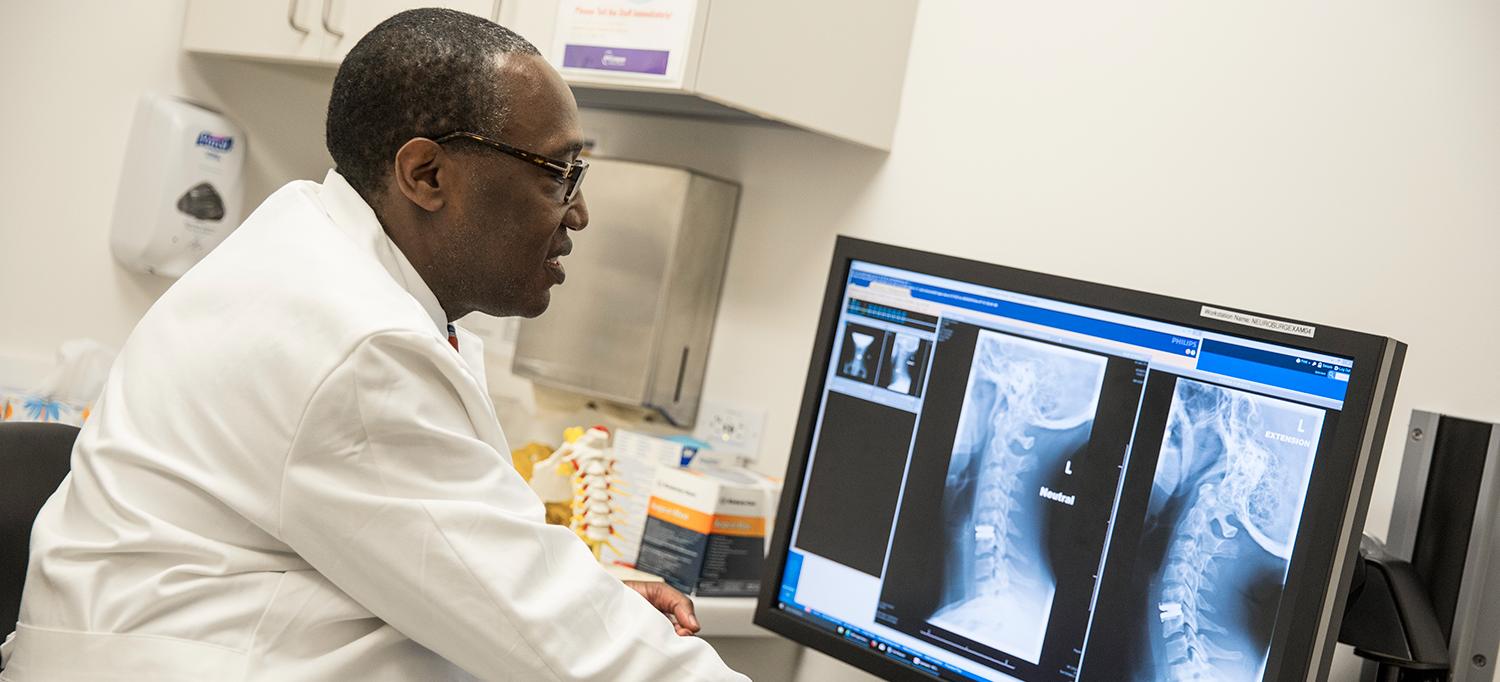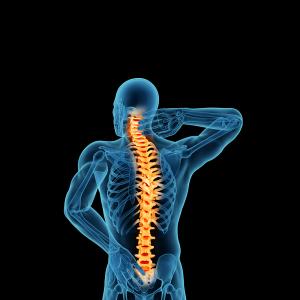
Dr. Anthony Frempong-Boadu reviews a spine X-ray.
Photo: NYU Langone Staff
Navigating daily life in New York City can place unwelcome strain on your neck and back, from toting heavy bags to sitting at a desk all day.
At NYU Langone’s Spine Center, one of the largest treatment programs for people with spinal disorders, our experts are familiar with the impact everyday activities can have on spine health.
“All of us, through the course of daily living, have back pain at some point in our lives,” says Anthony K. Frempong-Boadu, MD, a neurosurgeon at NYU Langone and co-director of the Spine Center.
Waking Up with Your Phone
One of the biggest culprits of neck pain is phone use. Many of us start our day by staring at our phones during the morning commute to work. The problem isn’t the phone itself, but the 45-degree angle at which we hold our necks while looking down at our phones.
“Essentially, you’re flexing your neck forward, pulling muscles, and stressing parts of your spine that shouldn’t be constantly stressed,” says spine specialist Charles Kim, MD. A solution to this is holding your phone at eye level.
Though neck pain is a common complaint, if it persists for more than two to three weeks, you should seek medical care. At the Spine Center, experts who include physiatrists, pain management specialists, neurosurgeons, and orthopedic surgeons evaluate people’s pain and can offer a diagnosis and a variety of treatments, such as nonsurgical interventional procedures and medical acupuncture.
Walking with High Heels or Heavy Bags
Walking is an essential activity of New York City life, but walking in high heels on a regular basis can affect your posture and lead to spine problems. “High heels change the natural standing position of the body and the spine,” explains John A. Bendo, MD, an orthopedic surgeon and co-director of the Spine Center.
Choosing sensible shoes is a first step, but even more important is getting rid of your heavy shoulder bag. “Putting stress on one side of the spine causes muscle tension, back pain, and accelerated arthritis,” Dr. Kim says.
If you can’t avoid carrying heavy loads, a backpack is a better option because it distributes the weight evenly on both sides.
Sitting at Your Desk
Sitting all day in an office chair can also take a toll on back health. “[It’s] not a natural activity for human beings,” Dr. Kim explains. “It puts stress on discs, which are like sponges. Sitting squishes the sponges, which means you could wear them out.”
A little wear on the spine is a natural part of aging, but persistent wear can lead to aching pain in the back or neck, which may be a symptom of degenerative disc disease.
If your pain is persistent, doctors at the Spine Center can evaluate your symptoms and conduct imaging tests to identify the cause of the pain and how much of the surrounding area is affected. As a preventive measure, Dr. Bendo recommends taking a break from sitting to walk a few minutes every hour.
“At your desk,” he suggests, “sit up straight and arch your back. You can even do isometric exercises at your desk—clench your buttocks or your stomach, hold for 20 seconds, and release.”
Weekend Workouts
“Weekend warriors who don’t exercise all week and then play tennis or rake the yard on Saturday afternoon are more likely to experience back pain,” Dr. Bendo says.
It’s important to warm up or cool down after a workout, particularly by stretching, he says. Equally important is knowing your body’s limits. “If you try to push through fatigue in your workouts, your risk for injury increases exponentially.”
Exercise routines that emphasize your core, such as yoga, are a good option to avoid back discomfort. As with all exercises, proper form and technique are key.
Time for Bed
When it comes to sleeping, Dr. Kim recommends taking the time to find a mattress and pillow that support your back comfortably.
“Spend hours, not minutes, testing mattresses,” he urges. “We spend a third of our lives in a bed. You can’t make that decision by bouncing on the bed for a few minutes. You need to simulate the act of sleeping.”
Although a certain amount of back pain is normal for anyone, back pain that starts at night or wakes you up warrants further medical attention, according to Dr. Frempong-Boadu.
When to Seek a Doctor’s Opinion
Whether back and neck pain occurs overnight or during the day, if it’s persistent and consistent, it’s always best to seek medical care. Other signs of when to visit a spine expert include the following:
- pain that is sharp or burning
- pain that radiates from a certain spot or is related to a particular motion
- pain that starts in your back and spreads to extremities
- pain that affects bowel or bladder function
Experts at NYU Langone’s Spine Center are experienced in diagnosing and treating all types of neck and back pain. Our team takes the time to properly diagnose the condition with physical exams and imaging tests, and offers treatments that range from medications to physical therapy and minimally invasive surgery.

